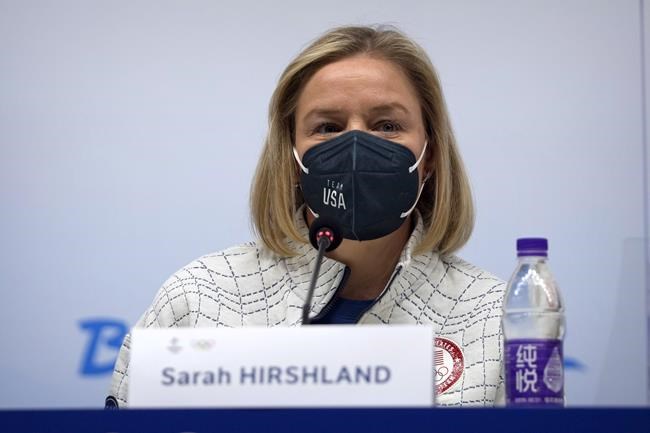US Olympic committee head says withholding medals ‘unfair’
Advertisement
Read this article for free:
or
Already have an account? Log in here »
To continue reading, please subscribe:
Monthly Digital Subscription
$0 for the first 4 weeks*
- Enjoy unlimited reading on winnipegfreepress.com
- Read the E-Edition, our digital replica newspaper
- Access News Break, our award-winning app
- Play interactive puzzles
*No charge for 4 weeks then price increases to the regular rate of $19.00 plus GST every four weeks. Offer available to new and qualified returning subscribers only. Cancel any time.
Monthly Digital Subscription
$4.75/week*
- Enjoy unlimited reading on winnipegfreepress.com
- Read the E-Edition, our digital replica newspaper
- Access News Break, our award-winning app
- Play interactive puzzles
*Billed as $19 plus GST every four weeks. Cancel any time.
To continue reading, please subscribe:
Add Free Press access to your Brandon Sun subscription for only an additional
$1 for the first 4 weeks*
*Your next subscription payment will increase by $1.00 and you will be charged $16.99 plus GST for four weeks. After four weeks, your payment will increase to $23.99 plus GST every four weeks.
Read unlimited articles for free today:
or
Already have an account? Log in here »
Hey there, time traveller!
This article was published 17/02/2022 (1397 days ago), so information in it may no longer be current.
ZHANGJIAKOU, China (AP) — The leader of the U.S. Olympic and Paralympic Committee called the decision not to award American figure skaters the silver medal they won in the team competition an outcome that is “frankly, unfair to the athletes.”
“There’s no question that our team wants to go home with the medals in their hands,” CEO Sarah Hirshland told The Associated Press in a video interview Thursday from Beijing. “That’s just a reality we’re all dealing with right now.”
The International Olympic Committee has determined it will not award any medals from competitions involving Kamila Valieva, the 15-year-old Russian figure skater whose positive test for a banned substance was revealed after she led her team to the gold medal last week.

The Americans took silver, but instead of the medals, IOC president Thomas Bach offered the U.S. skaters Olympic torches as a memento while the doping case plays out, according to people familiar with the situation. The people spoke on condition of anonymity because the decision was made in a private meeting.
Hirshland called the meeting between Bach and the skaters “productive,” but conceded it did not end with the result the U.S. wanted. Asked if the global anti-doping system was broken, the leader of the U.S. team said parts of it do work.
“And I think there are also components of the system that we still have a lot of reason to not trust entirely,” Hirshland said. “We’ve got to make sure that this continues to improve.”
While the focus of the Beijing Olympics are on the medal the Americans aren’t taking home, there are plenty more they are.
They headed into the final 72 hours of the Games with 21 medals, including eight golds. Hirshland said it puts the U.S. team about on pace with its internal projections and in range of matching its 2018 total of 23 (there are seven new events on the winter program in Beijing, and the U.S. has captured four medals from them).
There have been surprises along the way.
Alpine skier Mikaela Shiffrin went 0 for 5 in the individual races. But snowboarder Lindsey Jacobellis won two golds, and aerials skier Megan Nick won a bronze.
“If the outcomes were completely predictable, this wouldn’t be any fun for any of us,” Hirshland said.
Women have had a hand in winning 15 of 21 medals for the United States so far — either in women’s or mixed events — a headline accomplishment that will be celebrated throughout 2022, which marks the 50th anniversary of the gender-equity law known as Title IX.
Hirshland said she met recently with figure skater Vincent Zhou. Hardly any single athlete has been through as much as he has over these past two weeks. Shortly after helping the U.S. finish second in the still-in-limbo team event, Zhou tested positive for COVID-19. He was forced to sit out of the men’s event.
“He won’t ever get that opportunity that he missed, and that’s really difficult,” Hirshland said.
The USOPC was still trying to find some way for Zhou and company to head back to the United States with their medals. But time was running short and people are starting to pack up and head home.
One thing the doping case reminded Hirshland is that the USOPC and the IOC are not necessarily built to always get along.
“My job is to do what’s best for Team USA and those in our country,” Hirshland said. “And the IOC has 205 other countries … and 55 international federations who have their own agendas. And so, we’re going to have areas where we don’t see exactly the same.”
___
More AP Olympics: https://apnews.com/hub/winter-olympics and https://twitter.com/AP_Sports


